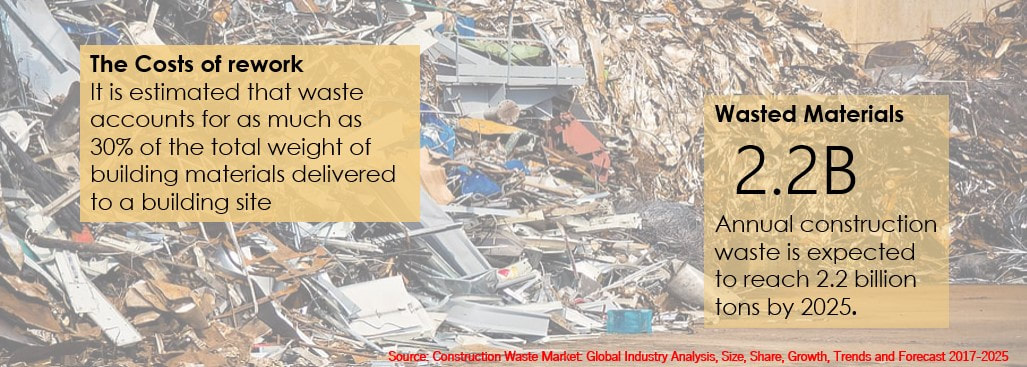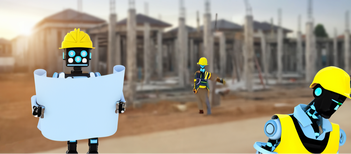Collaboration, Sustainability and Artificial IntelligenceThe cost of inefficient communication in our industry is staggering. Before COVID, before inflation, the annual cost of rework in the United States was 31 billion dollars.[i] In the US, rework directly caused by poor project data accounts for 48% of the total quantity of rework.[ii] Not only does rework waste money and create increased risks to safety and quality, it also imposes an unnecessary cost on the environment. According to ZERO, an industry collective working towards net zero construction, as much as 5% of the sector’s emissions can be attributed to rework.[iii] Eliminating the common and avoidable errors that result in rework. That’s where artificial intelligence comes in. Artificial Intelligence (AI) is about using technology to convert data into meaningful information. The data is no longer collected or generated only by human input. The internet has evolved from an environment for humans to communicate with each other, to a tool that enables communication between multiple objects and humans, creating a smart environment. It has the potential for improving decision-making by providing more information, and more accurate information, to design and construction professionals, ultimately enhancing their decision-making. AI tools that can help improve efficiency include tools to compare plans and specifications to make sure the correct information gets to the right people on time, AI-powered progress tracking, AI-powered safety monitoring, and AI-powered analytics. AI can be used to analyze data from a variety of sources to identify trends and patterns. For example, AI can be used to analyze data on material deliveries to identify potential delays. Construction is about managing complexities and the lasting value of AI technologies in construction will be how well they help us to manage those complexities and improve processes, productivity, quality, safety, and sustainability. To take a deeper dive into this topic, I recommend reading Sofiat O. Abioye a, et al. “Artificial Intelligence in the Construction Industry: A Review of Present Status, Opportunities and Future Challenges.” Journal of Building Engineering, Elsevier, 5 Oct. 2021. Available at www.sciencedirect.com/science/article/pii/S2352710221011578#cebib0010. Accessed 11 Oct. 2023. Endnotes: [i] FMI/Plangrid 2018 Industry Report : Construction Disconnected – Rethinking the Management of Project Data and mobile collaboration to reduce costs and improve schedules. Available at http://pg.plangrid.com/rs/572-JSV-775/images/Construction_Disconnected.pdf [ii] Id. [iii] Read more about this on the XYZ website blog, The Environmental Cost of Error and Rework in Construction, October 12, 2022, available at https://www.xyzreality.com/resources/the-environmental-cost-of-rework-in-construction Nancy GreenwaldExecutive Director at Construction Institute
0 Comments
Enhancing Business Development in Construction Management: The Transformative Power of CRM Systems8/1/2023 In the fast-paced and competitive world of construction management, fostering strong client relationships and streamlining business processes are paramount to success. One tool that has revolutionized the way construction management firms operate is Customer Relationship Management (CRM) systems. By providing a centralized platform to manage interactions with clients and prospects, CRM systems offer invaluable benefits to construction management firms seeking to bolster their business development efforts. Efficient Client Management A CRM system serves as a comprehensive database for all client information, including contact details, communication history, and project preferences. With this centralized repository, construction management firms can effectively manage client relationships. Having a 360-degree view of clients allows for personalized interactions and enables construction firms to anticipate client needs, ensuring an exceptional customer experience. Streamlined Sales and Marketing Processes Business development efforts in construction management rely heavily on efficient sales and marketing processes. A CRM system automates mundane tasks like lead generation, email campaigns, and follow-ups, freeing up valuable time for the business development team to focus on building meaningful connections and closing deals. The system's automated workflows ensure that no potential opportunity slips through the cracks. Accurate Data and Analytics Data is the backbone of any successful business development strategy. CRM systems not only store data but also provide valuable insights into clients' preferences, market trends, and sales performance. Access to accurate analytics empowers construction management firms to make data-driven decisions, identify profitable opportunities, and optimize their business development efforts. Enhanced Communication and Collaboration Effective communication and collaboration are vital for any construction management firm aiming to drive business growth. A CRM system fosters better internal communication by enabling teams to share client information and project updates in real-time. This seamless collaboration boosts overall productivity and ensures everyone is on the same page when it comes to client interactions and project progress. Strengthened Customer Retention Client retention is just as crucial as acquiring new clients. CRM systems facilitate proactive engagement with existing clients through reminders, anniversary notifications, and follow-up prompts. By nurturing long-term relationships, construction management firms can enhance customer loyalty and benefit from recurring business and referrals. Improved Lead Management The construction industry often deals with extended sales cycles and multiple stakeholders. A CRM system assists in tracking and managing leads throughout the sales process, enabling business development teams to prioritize opportunities, schedule follow-ups, and align their strategies with the unique requirements of each potential client. Data Security and Compliance Construction management firms handle sensitive client information, making data security a top priority. A reputable CRM system provides robust security measures to protect client data from unauthorized access and breaches. Additionally, CRM systems help construction firms adhere to industry-specific compliance regulations and data protection laws, mitigating potential risks. Conclusion In today's fiercely competitive construction management landscape, building and maintaining strong client relationships is essential for sustainable growth. A CRM system equips construction management firms with the necessary tools to optimize their business development efforts, enhance communication, and streamline sales and marketing processes. By leveraging accurate data and analytics, construction firms can make informed decisions, identify new opportunities, and provide exceptional customer experiences, ultimately setting themselves apart from the competition. Investing in a CRM system is more than just adopting new technology; it is a strategic move that empowers construction management firms to flourish in an ever-evolving industry. Embracing CRM systems as a core component of their business development strategy will undoubtedly yield remarkable results and position them for continued success in the future. Jim CecilVP Business Development | A.P. Construction It’s time to stop asking how AI is or will be used in the design and construction industry. The answer is that AI is already ubiquitous. AI is embedded in work in systems we use every day - Google maps, digital voice assistants, online search engines, anti-spam filters and anti-virus software, to name a few. According to Vantage Market Research, the global “AI in Construction Market” was valued at $594.6 Million in 2022 and is projected to reach a value of $ 4.9 billion by 2030. As a tool, AI allows us to collect and analyze data much more rapidly, which reduces error, increases efficiency, enhances our ability to make good decisions and frees us up to perform tasks requiring creativity and ingenuity. If you ask BARD (Google’s conversational AI) to tell you what tasks AI is best suited for in the design and construction industry, here’s what it will tell you. (1) Automating repetitive tasks like scheduling, planning, and inventory management. (2) Improving safety on construction sites by detecting potential hazards, monitoring workers' health and fatigue levels, and to providing real- time alerts if there is a risk of injury. (3) Optimizing the use of materials and resources on construction sites. For example, AI can be used to predict the demand for materials, to optimize the routing of deliveries, and to track the use of materials throughout the construction process. (4) Improving quality control by detecting defects in materials and workmanship and monitoring the progress of construction projects, and to provide early warnings of potential problems. (5) Generative design AI can be used to innovate new designs for buildings and infrastructure and can simulate the performance of new designs, and to test them for safety and efficiency. Of course, these are the first areas where we are seeing AI developed in our industry. The list of examples is too long for a single blogpost. If you want to learn more, listen to the Institute’s webinar – Artificial Intelligence: A Force Multiplier for the AEC Industry. AuthorNancy Greenwald, Executive Director |
WelcomeGet to know member news, read CI's publishing's, and more on The Construction Institute's blog. Categories
All
|
|
Connect With Us On
|
Contact Us
1137 Main Street, Suite 206, East Hartford, CT 06108 Phone 860.904.6101 | sitemap Copyright The Construction Institute, Inc. All Rights Reserved. |




 RSS Feed
RSS Feed